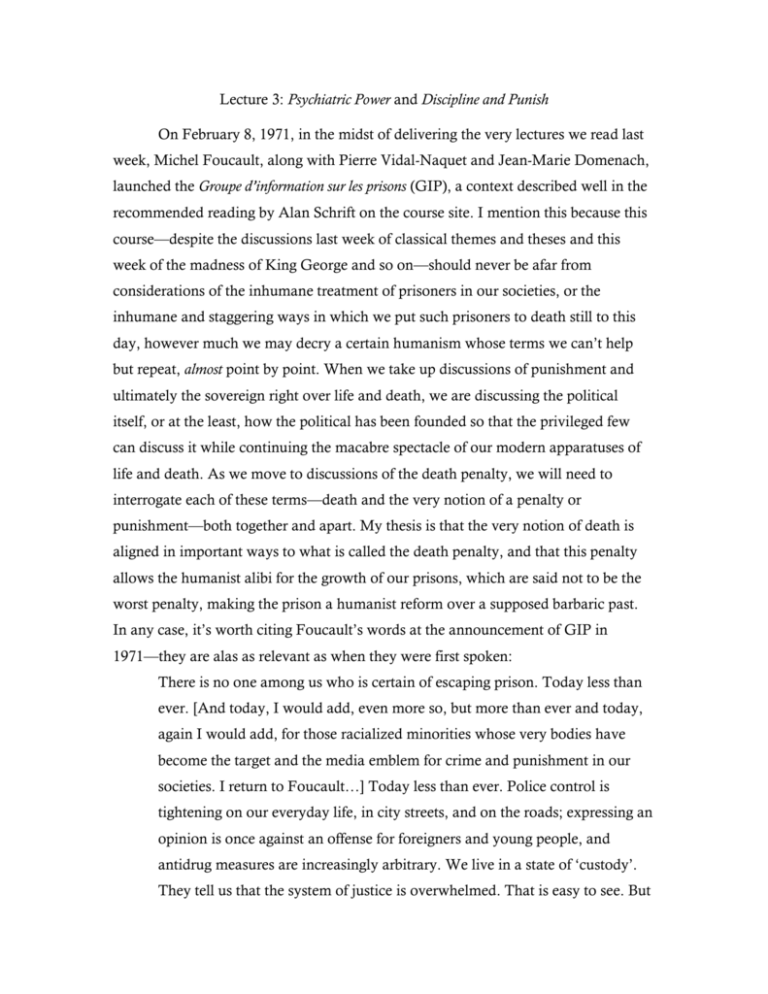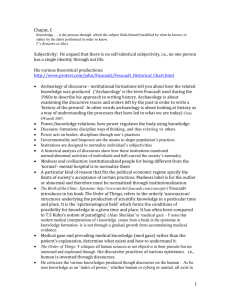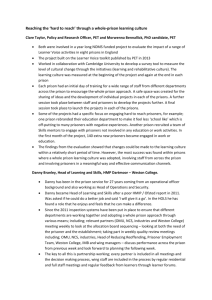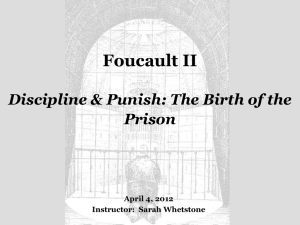lecture three
advertisement

Lecture 3: Psychiatric Power and Discipline and Punish On February 8, 1971, in the midst of delivering the very lectures we read last week, Michel Foucault, along with Pierre Vidal-Naquet and Jean-Marie Domenach, launched the Groupe d’information sur les prisons (GIP), a context described well in the recommended reading by Alan Schrift on the course site. I mention this because this course—despite the discussions last week of classical themes and theses and this week of the madness of King George and so on—should never be afar from considerations of the inhumane treatment of prisoners in our societies, or the inhumane and staggering ways in which we put such prisoners to death still to this day, however much we may decry a certain humanism whose terms we can’t help but repeat, almost point by point. When we take up discussions of punishment and ultimately the sovereign right over life and death, we are discussing the political itself, or at the least, how the political has been founded so that the privileged few can discuss it while continuing the macabre spectacle of our modern apparatuses of life and death. As we move to discussions of the death penalty, we will need to interrogate each of these terms—death and the very notion of a penalty or punishment—both together and apart. My thesis is that the very notion of death is aligned in important ways to what is called the death penalty, and that this penalty allows the humanist alibi for the growth of our prisons, which are said not to be the worst penalty, making the prison a humanist reform over a supposed barbaric past. In any case, it’s worth citing Foucault’s words at the announcement of GIP in 1971—they are alas as relevant as when they were first spoken: There is no one among us who is certain of escaping prison. Today less than ever. [And today, I would add, even more so, but more than ever and today, again I would add, for those racialized minorities whose very bodies have become the target and the media emblem for crime and punishment in our societies. I return to Foucault…] Today less than ever. Police control is tightening on our everyday life, in city streets, and on the roads; expressing an opinion is once against an offense for foreigners and young people, and antidrug measures are increasingly arbitrary. We live in a state of ‘custody’. They tell us that the system of justice is overwhelmed. That is easy to see. But what if the police are the ones who have overwhelmed it? They tell us that the prisons are overcrowded. But what if the population is over-imprisoned? …We propose to let people know what prisons are: who goes there, and how and why they go; what happens there; what the existence of prisoners is like [etc.] (cited in Schrift, 137-8). GIP was formed around a certain will to know what was unknown in France at the time and perhaps today; those who are shoved to the geographical margins of our societies are rendered voiceless and counted in all but the meaningful sense of the term. We can, thinking back to the readings from last week, no more go back on the “will to know” than we can jump over our own shadows, and at least in this turn of GIP’s formation, there would be a will to know what prison was like for the masses living there. GIP was formed, as many of you know, less to change the prison conditions than as simply as function of this will to know, this volonté de savoir, that is, to gather information on this institution of institutions in French society. The belief of GIP was that this knowledge itself, to use the cliché, was power—and viceversa. And GIP set out to provide this information. I leave you to Schrift’s short section on this for more—as well as other, many texts I could recommend, but I wonder if for the moment this will to know has itself been exhausted with regard to prisons: without in the least criticizing Foucault’s group’s important work, I wonder if there has been a shift since then, since we know what we do not know about the prisons; we know the mass use of solitary confinement and its terrorism of the soul; we know about the lives made to live on in utter loss of friendships and family, community and anything that was once was called a human bond—all to give society an alibi for its neglect of inequal social structures, inadequate schooling, dilapidated public squares, and so on. The criminal element is our alibi and the prison is nothing but a monument to our societal faults. GIP was formed in the idea that letting people know about these conditions would—if not set those very prisoners free—lead to ameliorations in their conditions. Perhaps that’s all we can ever do. But 40 years on, prisons also have a different function. In ways more than simply the fact that the center requires its margins, or the history of racism in the US and elsewhere, and so on, we have so many communities that depend financially on these institutions—they create the sequestered jobs our economies no longer do, a circle of the margins being made to feed on the margins, while our populations remain over-imprisoned, the police overwhelm those they are to protect, and we know, as Foucault put it, that the antidrug laws were nothing but arbitrary… and yet it goes on. If Foucault is right that there is no one who is ensured of escaping prison, one can wonder if we in Western societies are ever going to escape the prison industrial complex, as Angela Davis calls it, of thinking some other way of holding our society together than by marginalizing and imprisoning the poor and the dispossessed, those whose only place our neoliberal societies will provide for—whose only outlet for government funding—is the prison itself. One day, perhaps—and this day, must, if time is anything, be ever closer even as the glimmer of it seems as far away as ever—we as Western societies, like in some old 30s caper, will see our way over the gates of our prison houses and make a run for it, there onto some space of land beyond the prison and its very idea itself. But to do so, we will need intellectual and other whiles as complex as any escape plans from those old movies. Which would mean, first, figuring out how we landed in this prison—imprisoned in the very idea of prisons across our landscapes—in the first place. We see in the readings this week a deep tonal shift from the 1970-1 lecture course, but not a wholly different account of the political. Already we get on the second page of the lectures the mention of disciplinary power, which aims at a “certain objectivity” and produces not individuals, but “bodies, behavior, and discourses” (3). This seeking of scientificity and objectivity had been aligned in 1970-1 to a long to will to know in the West dating to early Greece. Here we quickly learn, in the PP lectures, there is an asymmetry of power given by “medical authority” that “functions as power well before it functions as knowledge,” and thus Foucault is interested in the how of psychiatric power, how it functions in terms of an “unlimited power” within the asylum within an “immanent order”—there is no outside of this power. Indeed Foucault delivers the great lesson he began to find in Greek democracy in 1970-1, where power was not held but dispersed among the polis: [I]n the asylum, as everywhere else, power is never something that someone possesses, any more than it is something than emanates from someone. Power does not belong to anyone or even to a group; there is only power because there is dispersion, relays, networks, reciprocal supports, differences of potential, discrepancies, etc. It is in this system of differences which have to be analyzed that power can start to function. (4) In this way, there is a “battlefield” in the asylum (7), where madness is no longer, in the early 19th century, said to be a mistake of beliefs; now it is “the insurrection of a force, of a furiously raging, uncontrolled and possibly uncontrollable force within him”: 1) raging; (2) unbridled instincts and passions; (3) makes ideas incoherent— mania; (4) melancholia or monomania. Foucault is also largely self-critical of his conclusion chapter to the book that first made his fame, Histoire de la folie, saying that he remained too much at the level of institutions, violence, and family, as well as an analysis of “representations” of madness, not its production. From herein, he wish to look at the “apparatus [dispositif] of power…to what extent can an apparatus of power produce statements, discourses, and consequently all the forms of representation may then derive from it” (13). This allows him to compare what he is attempting in Psychiatric Power with archaeology: The apparatus of power as a productive instance of discursive practice. In this respect, in comparison with what I call archaeology, the discursive analysis of power would operate at a level—I am not happy with the word ‘fundamental’—let’s say at a level that would enable discursive practice to be grasped at precisely the point where it is formed.” (13) We cannot get beyond representations at the level of economic structures and relations of production. He wants instead to look at the link of an “apparatus of power and game of truth” (13). He notes his own replacement of these models with “pseudo-military vocabulary” that he had said in NGH was derived from Nietzsche’s work on power. Is this an advance? Here he states it programatically: let’s see where it goes (17). In the next chapter, he presents the scene I went over in some detail in my first lecture—the madness of King George and the passage from one form of power (sovereign) to another (disciplinary). As with the opening of Discipline and Punish, this shows Foucault’s real skill as a writer—to find an exemplary scene from which he elucidates telling signs of a given discourse or forms of power relation. The madness of King George is in itself remarkable since it is indeed the pass-off from his sovereignty and his reduction to a disciplined body (21). This is not the madness of Lear, he remarks, who roams the world aimlessly, but an “anonymous, nameless, and faceless power that is distributed between different persons…silent” (21). This power—and here is the first mention in his oeuvre of this phrase—is “what I will call disciplinary power” (22). I cited a bit from this chapter in week 1, so let me pick up from different quotations that make name the distinctiveness of this “new” form of power: One type of power, that of sovereignty, is replaced by what could be called disciplinary power, and the effect of which is not at all to consecrate someone’s power, to concentrate power in a visible and named individual, but only to produce effects on its target, on the body and very person of the dethroned king, who much be rendered ‘docile and submissive’ by this new power. Whereas sovereign power is expressed through the symbols of the dazzling force of the individual who holds it, disciplinary power is a discreet, distributed power; it is a power which functions through networks and the visibility of which is only found in the obedience and submission of those on whom it is silently exercised. (22) Thus we must think as absolutely heterogeneous the “macrophysics” of sovereignty and the “microphysics of disciplinary power” (27). And the move to this latter is not necessarily the humanistic scene often depicted of Pinel and others, who freed the mad from the dungeons in order to be (eventually) cured. Rather, “the person liberated will settle his debt continually and voluntarily by obedience…subjection through grateful obedience,” in short, not the violence of sovereignty but the “subjection that is the a relationship of discipline” (28). In this way, he says what is necessary is to analyze the “game of power” before “any institutional organization, or discourse of truth, or importation of models” (32). In his third lecture, Foucault provides something like a genealogy of disciplinary power that will be his focus for much of the next four or five years, beginning in monastic institutions and spreading via pedagogical insitutions and elsewhere to finally becoming a widespeard form of power that “reaches the level of bodies and gets a hold of them, taking actions, habits, and words into account” (40). Disciplinary power: a “seizure of the body,” not one’s products in terms of taxes, etc., a “seizure of time in its totality,” not service to the king, etc. He notes the changeover in the militaries of the 17th to the 19th centuries. Disciplinary power is “continuous” not discontinuous, and refers not to an arché or beginning point or contract, as in sovereign power, but “looks forward to the future, towards the moment when it keep going by itself and only a virtual supervision will be required, when discipline, consequently, will have become habit” (47). Let me leave off here, since Kyla will describe much of this in more and better detail. Turning to Discipline and Punish, we should recall that the French title for the book, published in 1975, was Surveiller et punir: Naissance de la prison. Ironically, the translator Alan Sheridan argues in his preface that “survey” or “surveillance” were not quite the right fit for the French, though with the work of the national surveillance agency (NSA) in recent years, it’s hard to argue this would be still the case. I won’t discuss now the obvious links between the focus on discipline and Panoptocism in Psychiatric Power and the discussions in Discipline and Punish that, too, tell the story of a hand-over from sovereign to disciplinary power. Some points: 1. It could be said that Foucault misdates the birth of the prison since, as more than one student has commented over the years, there were various means of detaining and housing so-called prisoners going back centuries. But we should be clear that just as in Psychiatric Power there is changeover in the military from its sovereign form to its disciplinary form, so too we must understand “the prison” as historically complex and original dispositif. That is to say, the mere detaining and putting into bondage other humans is one thing; prisons are essentially disciplinary on Foucault’s account. Now, it’s clear that Foucault means for his analysis to be geographically distinct to the French example, though he does touch on Pennsylvania as an important model. But one wonders if the American prison system was ever so disciplinary, given that reform has always been marginal in its practices, even if the term had more prominence at some moments in US history over others. But we can also ask the Foucaultian question of whether in fact the “prison” as he understands it is still functional in the West. Zigmat Bauman has argued that the Panopticon is less the utopian prison now than Pelican Bay in California, a prison that is designed to be automated and to limit both prisoner’s contact with each other and the outside, and with the rampant use of solitary confinement is less concerned with a “micro-physics” of the body than its complete inoperativity and immobilization. The recent work of Lisa Guenther, for example, has been perspicuous and important in this regard. To cut what needs to be a much longer conversation short, if Foucault is right to argue that there is something like a part-whole relation between the prison and other frontiers of disciplinarity in our societies, then we should also look to post-disciplinary forms of power operative beyond Pelican Bay, for example, in the command and control environs of our inner cities as well as all that has been described under the heading of the “militarization” of our states’ police functions. Let me posit perhaps a quick thesis: sovereign power, as Foucault notes, was about “deduction”—taking in the form of lives and taxes. Disciplinary power is productive, producing the subjects through its writings on and as the disciplined body. A post-disciplinary apparatus, if there is such a thing, produces absolute inoperativity—a term I borrow for its important uses in several figures, such as Giorgio Agamben—creating seamlessly functioning prison apparatuses in which there is not even the bare being-with of disciplinary power, a paradoxical form of power that rivots the soul absolutely into the body of the one in solitary confinement, and thus removing any chance for keeping a soul in the first place. 2. Foucault is providing not just a history of the birth of the prison—he calls it a history of the present to denaturalize its place in French society, in line with his work with GIP—but also something like the long end, I would dare use the word closure in its Heideggerian sense, of the death penalty. He begins, of course, with the account of Damien the Regicide and slowly moves through the various “humanistic” reforms to the death penalty and its declining use correlative to the rise of disciplinary power. Though writing while the death penalty is still in force in France—the last to face the gallows would be three years after this book went to print—one could imagine this book as describing the long, slow death of the death penalty itself. We will need to compare his account of a similar history to that of Derrida, as well as the arguments such figures as Becarria make concerning why eternal imprisonment is more “humane” than the death penalty, against which he long advocated. We will need to isolate these arguments in detail in the coming weeks while turning to Derrida’s lectures. 3. Finally one last question to open: is Foucault too neat in these lectures in differentiating these forms of power, one from the other? I won’t bore you with claims from my own book on sovereignty, but suffice it to say that I think Foucault would agree that there is never a purely disciplinary site nor a sovereign one and so on, that at best these are heuristics for understanding historically co-implicated and inter-spersed forms of power operative on the scaffold and in the prison yard, in the medical office and at the royal court. In any case these questions are far from abstract for those facing the gallows and the permanent solitude of our contemporary prisons. We often look to these men and women as failing our society; it’s long been clear that prisons mark something of our own failure to rethink apparatuses that subjugate those on the margins of our society, while our politics becomes imprisoned in chatter about anything but what truly matters: how our societies punish others and thus always a part of itself.






